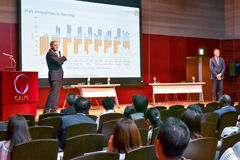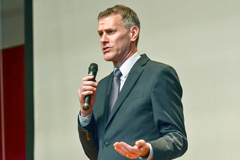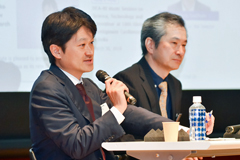Tackling the "Learning Crisis": World Development Report 2018 Seminar Held
2018.08.03
The seminar "World Development Report 2018: LEARNING to Realize Education’s Promise" was jointly hosted by the JICA Research Institute (JICA-RI), the World Bank Group and the National Graduate Institute for Policy Studies (GRIPS) on June 21, 2018 in Tokyo.
The World Bank Group has published the World Development Report (WDR) annually since 1978. The WDR is a compilation of analyses of issues and policy recommendations on a timely theme. The theme of WDR 2018 was "LEARNING to Realize Education's Promise," addressing education for the first time.

WDR 2018 Co-directors talked about "learning crisis" in developing countries
At the seminar, WDR 2018 Co-directors Dion Filmer and Halsey Rogers of the World Bank Group gave lectures. Professor Kazuhiro Yoshida from Hiroshima University and Eiji Kozuka, director, Basic Education Team II, Human Development Department, JICA and senior research fellow at JICA-RI, provided comments.
First, Filmer began by saying that "one of the main messages of the report is that schooling is not the same as learning.” He explained that the majority of children in developing countries do not acquire the minimum level of reading and arithmetic skills that should be learned in elementary school. This is what we call a “learning crisis” in the report, he said. Because the learning that happens in school will become the skills needed in the labor market, education helps people earn appropriate incomes and escape from poverty. At the national level, education drives productivity and encourages economic growth. Showing data on current circumstances worldwide indicating that education is not being conducted sufficiently, Filmer pointed out that no investment made by a nation can be expected to be as effective as education.

WDR 2018 Co-directors Dion Filmer analyzed current situation and issues of education in developing countries
Why are children not able to learn? Filmer explained that it is because of the lack of coherence between elements—learners, skilled and motivated teachers, effective school inputs and skilled school management. For example, malnutrition prevents poor children from paying attention in class; teachers are absent or do not have sufficient knowledge in their subjects; it takes years to install school equipment, which are not used even when they become available. Filmer noted that various actors, including politicians, bureaucrats, civil society organizations, employers, international organizations are involved in education, but each with its own political and economic interests, causing it to fall into the “low-learning trap” that prevents actors from aligning to make the whole system work for learning.
Rogers cited examples of improvement in school education in South Korea, Vietnam and other countries, and introduced the actions suggested by WDR 2018. First is to thoroughly assess learning progress, second is to act on scientific evidence to make schools work for all learners, and third is to collaborate with related parties to make the whole system work for learning. Filmer also suggested ways to break out of the low-learning trap: disclosure of information that sparks the interest of society in this issue, encouragement of collaboration between the parties involved, and improvement of school education in a manner suited to the nation or region.
Commenting on the lectures, Yoshida touched on global efforts related to educational development that promoted "Education for All" since the 1990s, and the history and types of education economics. He pointed out that Japan has the expertise to improve education, and should be able to play the role of transferring it to developing countries. However, he said that expertise cannot be used as-is, so the local ownership, or the initiative of local-level players is the key to ensuring that it is molded to meet local circumstances.

WDR 2018 Co-directors Halsey Rogers introduced the actions suggested by WDR 2018

Eiji Kozuka from JICA (left) and professor Kazuhiro Yoshida from Hiroshima University provided comments
Kozuka said that the most important keyword in this report is “system” and it is vital that educational policy is formulated in a manner that is suited to the individual country, in light of the diverse and complex interaction of players and systems. Introducing the "Impact Evaluation Analyses for the JICA Projects," a JICA-RI research project addressing education and healthcare, he explained that the severity of the learning crisis has not been sufficiently recognized in developing countries, and many parents are just relieved when their children merely attend school. For that reason specifically, the first step in fighting the learning crisis, he said, is for the relevant parties to understand the current state of children's learning.
There were many questions from the audience, with topics including methods of training teachers, collaboration between stakeholders, and the Japanese-style education being implemented in Egypt. Finally, JICA-RI Director Nobuko Kayashima concluded the seminar, saying "I have gotten a renewed sense that there is not just one global solution to education. WDR 2018 is not a prescription as the sole solution, but should be used as a guidebook when exploring educational development, in consideration of the unique backgrounds and circumstances of each country.” She revealed that the plan for WDR 2019 “The Changing Nature of Work,” is to include a continued discussion on education, and she called attention to education as the target of even more effort.

事業事前評価表(地球規模課題対応国際科学技術協力(SATREPS)).国際協力機構 地球環境部 . 防災第一チーム. 1.案件名.国 名: フィリピン共和国.

事業事前評価表(地球規模課題対応国際科学技術協力(SATREPS)).国際協力機構 地球環境部 . 防災第一チーム. 1.案件名.国 名: フィリピン共和国.

事業事前評価表(地球規模課題対応国際科学技術協力(SATREPS)).国際協力機構 地球環境部 . 防災第一チーム. 1.案件名.国 名: フィリピン共和国.

事業事前評価表(地球規模課題対応国際科学技術協力(SATREPS)).国際協力機構 地球環境部 . 防災第一チーム. 1.案件名.国 名: フィリピン共和国.

事業事前評価表(地球規模課題対応国際科学技術協力(SATREPS)).国際協力機構 地球環境部 . 防災第一チーム. 1.案件名.国 名: フィリピン共和国.
scroll